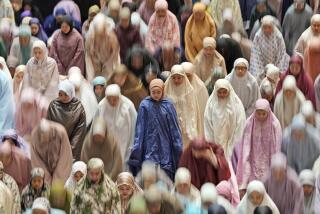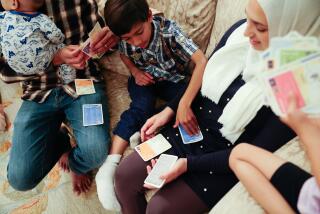Does a Birthday Party Dishonor Muhammad?
- Share via
He is so revered that 1,400 years after his revelation from God, Muslims worldwide still strive to imitate even the smallest details of the prophet Muhammad’s life: eating dates, for instance, or using their right hand.
His life has inspired an entire branch of Islamic science known as hadith, in which more than 50,000 accounts of his words and deeds have been categorized, classified, endlessly analyzed and used as the model for Muslim behavior.
But when it comes to celebrating the birthday of their beloved prophet, Muslims display their devotion in distinctly different--and debated--ways.
At Momin Lodge in Torrance this week, a standing-room-only crowd of 1,500 Muslims, many draped in the colorful, flowing garb of South Asia, sang praises to Muhammad, lectured on lessons from his life and shared a communal meal. Although the prophet’s exact birthday is debated, the lodge celebrated it Monday.
“He influences everything in my life,” said Amina Khan, 19, a native of India and an Orange County college student. “These celebrations are meant to show how much we love him.”
At the sumptuous King Fahd Mosque in Culver City, however, the prophet’s birthday came and went unheralded.
To Usman Madha, a native of Myanmar, ignoring the prophet’s birthday represented his expression of devotion and love. If imitation is the highest form of flattery, he said, then Muslims should not celebrate his birthday because neither the prophet nor his companions did.
“If one wants to praise the prophet, we’re doing it five times a day in daily prayers,” said Madha, the mosque’s community liaison. “Let’s not bring something into the faith that was not there.”
The diverse approaches in the Southland this week reflect a debate that has raged for centuries within Islam. The crux is how to interpret the prophet’s warnings against innovation in the faith, words intended to keep Islam pure and free from syncretism and corruption.
To people like Madha who subscribe to an orthodox school of thought called Salafi, prevalent in Saudi Arabia and other Persian Gulf states, the words should be interpreted strictly and literally. No innovation means exactly that: doing nothing that the prophet and his companions did not do, including his own birthday celebrations.
Madha wonders: If Muslims start commemorating the prophet’s birthday with songs of praise, can greeting cards be far behind? Will the prophet’s birthday move from a sacred to a secular event, the way Christmas images often focus on Santa Claus, reindeer, colored lights and a frenzy of gift-giving?
“Now the prophet’s birthday is becoming the equivalent to Christmas,” he fretted. “This is going to lead to crass commercialism.”
Such views held sway among American Muslims for decades, in part because the Salafi school heavily influenced many of the Islamic scholars, imams and financial backers of mosques here. When Muslim convert Gillian Izhar first moved to Southern California 11 years ago, she said she could find no celebrations. Now they are everywhere--in Rosemead, Las Vegas, Corona, Los Angeles. Realizing Madha’s worst fears, some Muslims are even talking about starting a birthday parade in New York.
In part, the growing embrace of birthday celebrations in the United States is driven by brisk immigration of Muslims from all parts of the world. The diversified community has loosened the Salafi grip and emboldened Muslims to practice their own traditions of celebrating the prophet’s birthday, said Aslam Abdullah, president of the American Federation of Muslims From India.
In India, for instance, the prophet’s birthday brings out millions of Muslims dressed in their best finery for a daylong celebration featuring parades, free food distribution, speeches and songs. In Morocco, the king himself organizes the function. Egypt declares the birthday an official holiday. The American love of celebration has also influenced Muslims to embrace the birthday events, Abdullah said. And some Islamic scholars have worked to encourage them here.
Izhar said her teacher, Shaykh Hisham Kabbani, has written articles and books arguing that celebrating the prophet’s birthday is permissible and common practice in most Muslim countries. Izhar, a practitioner of the mystical dimension of Islam known as Sufism, said Sufi Muslims have always embraced the celebrations with devotional chanting known as dhikr, songs and stories about the prophet.
In April, one of Islam’s most respected scholars, Shaykh Yusuf Al-Qaradawi of Qatar, backed the commemorative events. Although noting the ban on innovation, the scholar said the commemorations would help revive the lessons of the prophet for successive generations of Muslims who have begun to forget their history.
“Actually, celebrating the prophet’s birthday means celebrating the birth of Islam,” he wrote. “I think that these celebrations, if done in the proper way, will serve a great purpose, getting Muslims closer to the teachings of Islam and to the prophet’s sunna [conduct] and life.”
That’s exactly what Muslims say their celebration this week at Momin Lodge accomplished. The cavernous hall was unadorned except for a large green banner proclaiming the birthday commemoration, known as Milad-Un-Nabi, and a string of colored lights. There were no balloons, certainly no birthday candles. But an air of deep devotion permeated the room, as women and men stood to sing hauntingly beautiful praises in the native Urdu language of many of the Pakistanis present.
Hassan Hathout of the Islamic Center of Southern California spoke passionately of the need to emulate the prophet’s love for all--a duty far more important, he said, than imitating his dress or food preferences.
“The key to his personality is that he was a very loving man,” Hathout said. “Before prayer and fasting and rules and regulations, Allah tells him that ‘we have sent you for mercy.’ ”
Abdullah spoke of the prophet’s magnanimity and ideals of social justice--for women and men alike. He noted that the prophet appointed women to take care of the community’s spiritual needs in Medina when he left to fight the Battle of Badr, and that he refused to take revenge against his enemies. But Abdullah lamented that the majority of Muslim women are illiterate today and that “revenge has become one of the dominant features of the Muslim character.”
“We are the violators of the message of the prophet,” Abdullah declared.
For Mursel Azar, a teenager who attended the gathering, the prophet’s lessons of life are simple. One of her favorite stories is how the angel Gabriel appeared to the prophet in a cave and told Muhammad, then an illiterate merchant, to learn to read.
Mursel, a 13-year-old American of Afghan descent, said the story inspires her to do her best in school: “He wasn’t afraid, and he was open-minded to try new things.”
More to Read
Sign up for Essential California
The most important California stories and recommendations in your inbox every morning.
You may occasionally receive promotional content from the Los Angeles Times.














